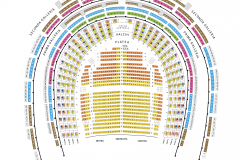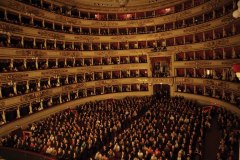Lady Macbeth of the Mtsensk District
December 2025 | ||||||
|---|---|---|---|---|---|---|
Mo | Tu | We | Th | Fr | Sa | Su |
Lady Macbeth of the Mtsensk District - Dmitrij Dmitrievič Šostakovič
Opera in four acts
Libretto by Aleksandr Prejs and Dmitrij Šostakovic
On the 50th anniversary of Shostakovich’s death, La Scala opens the Season with his masterpiece Lady Macbeth of the Mtsensk District, based on the novella by Nikolai Leskov. In the story, a young wife, with the help of her lover, murders her husband and her father-in-law, but is eventually discovered and ends up committing suicide in Siberia, betrayed by everyone. After its premiere in St. Petersburg, the opera – which was intended to be the first part of a trilogy on women’s condition in Russia – enjoyed great success at home and abroad. Stalin attended a performance in Moscow in 1936; two days later, the famous denunciation titled “Chaos Instead of Music” appeared in Pravda, through which the regime blacklisted the opera and its composer. Years later, Shostakovich prepared a new version that was staged in Moscow in 1963 under the title Katerina Izmailova, after Superintendent Ghiringhelli had unsuccessfully tried to secure its premiere for La Scala. Today, the theatre presents the original 1934 version, conducted by M° Chailly and the debut of director Barkhatov.
Synopsis
Although the opera shares the basic characters and outline of the book, it has a number of differences from the original story in terms of plot and emphasis. One example is in the convoy after Katerina gives Sergei her stockings: in the opera, all the women mock Katerina, whereas in the story, Sergei and Sonya mock her while Fiona and Gordyushka shame them in response to their cruelty toward her.
Act 1
Scene 1: Katerina's room
Katerina is unhappily married to Zinovy, a provincial flour-merchant. She complains to herself of her loneliness. Her father-in-law, Boris, angered at her response to his saying that mushrooms are his favourite dish, says that her loneliness is her fault due to her not producing an heir. She replies that Zinovy cannot give her a child – which Boris disdains; he then threatens her if she decides to accept some youthful lover. Zinovy is called away on business, and Boris – against his son's inclinations – makes Katerina swear before an icon to be faithful. A servant, Aksinya, tells Katerina about the womanising new clerk, Sergei.
Scene 2: The Izmailovs' yard
Sergei and his comrades are sexually harassing Aksinya. Katerina intervenes. She berates him for his machismo and asserts that women are as brave and capable as men. Sergei is willing to prove her wrong and they wrestle; she is thrown down and Sergei falls on top of her. Boris appears. She says that she tripped and Sergei, in trying to help her, fell down also. The other peasants back her up. Boris however is suspicious and roars at the peasants, telling them to get back to work, before ordering Katerina to fry some mushrooms for him and threatening to tell Zinovy about her behaviour.
Scene 3: Katerina's room
Katerina prepares to go to bed. Sergei knocks on her door with the excuse that he wants to borrow a book because he cannot sleep, but Katerina has none; she cannot read. As she is about to close the door, he attempts to seduce her by remembering their wrestling match earlier that day. He gets into the room and forces himself on her. Afterwards, she tells him to leave, but he refuses and she agrees to embark on an affair with him. Boris knocks on the door and confirms that Katerina is in bed and locks her in. Sergei is trapped in the room, and the two make love again.
Act 2
Scene 4: The yard
One night a week later. Boris, unable to sleep due to unease about thieves, is walking in the courtyard in the pre-dawn darkness. He, remembering his days as a young rake and knowing Zinovy's low libido, is considering seducing Katerina himself to fulfill his son's marital duties. He spots Sergei climbing out of Katerina's window. He catches him and publicly whips him as a burglar, then has him locked up. Katerina witnesses this but cannot stop this because she remains locked in her room. When she eventually manages to climb down the eavestrough-drainpipe, the other servants restrain her on Boris' order. After being exhausted by beating Sergei, Boris demands a meal, saying that he will whip Sergei again the next day and dispatches a servant to recall Zinovy, saying that Zinovy is to be told that there's trouble at home. Katerina adds rat-poison to some mushrooms and gives them to him. As he is dying, calling for a priest, she retrieves the keys to free Sergei. The priest, called by the arriving morning shift of workers who find Boris in agony, arrives: Boris vainly tries to tell him that he was poisoned and falls back dead pointing at Katerina. Katerina, weeping crocodile tears, convinces the priest that Boris has accidentally eaten poisonous mushrooms and he says a prayer over Boris' body.
Scene 5: Katerina's room
Katerina and Sergei are together. Sergei querulously says that their affair will have to end due to Zinovy's impending return and that he wishes that he and Katerina could marry – Katerina assures him that they'll marry but refuses to tell him how she'll arrange it. Sergei then falls asleep; Katerina is then tormented by Boris' ghost and cannot sleep. Later, she hears Zinovy returning. He has been called back by one of the servants with the news of his father's death. Although Sergei hides, Zinovy sees his trousers and belt and guesses the truth. As he and Katerina quarrel, he whips her with the belt. Hearing Katerina's cries, Sergei emerges and confronts Zinovy, who then tries to escape to call the servants. Katerina stops Zinovy: she and Sergei then proceed to strangle him; he is finally finished off by Sergei with a blow on the head with a heavy candlestick. The lovers hide the corpse in the wine-cellar.
Act 3
Scene 6: Near the cellar
Following Zinovy's disappearance, he has been presumed dead. Katerina and Sergei prepare to get married, but she is tormented by the fact that Zinovy's corpse is hidden in the wine cellar. Sergei reassures her and they leave for the wedding ceremony. A drunken peasant breaks into the cellar, finds Zinovy's body and goes to fetch the police.
Scene 7: The police station
The police are complaining about not being invited to the wedding and vainly try to distract themselves by tormenting a socialist schoolteacher because of his alleged atheism when the peasant arrives and gives them the opportunity for revenge.
Scene 8: The Izmailov garden
Everyone is drunk at the wedding. Katerina sees that the cellar door is open, but the police arrive as she and Sergei are trying to escape.
Act 4
Scene 9. A temporary convict camp near a bridge
On the way to katorga in Siberia, Katerina bribes a guard to allow her to meet Sergei. He blames her for everything. After she leaves, Sergei tries to seduce another convict, Sonyetka. She demands a pair of stockings as her price. Sergei tricks Katerina into giving him hers, whereupon he gives them to Sonyetka. Sonyetka and the other convicts taunt Katerina, who pushes Sonyetka into an icy river – also, herself, falling in. They are swept away and the convict train moves on.
Program and cast
Conductor: RICCARDO CHAILLY
Staging: VASILY BARKHATOV
Sets: ZINOVY MARGOLIN
Costumes: OLGA SHAISHMELASHVILI
Lights: ALEXANDER SIVAEV
Cast
Boris Timofeyevich Izmaylov: Alexander Roslavets
Katerina L’vovna Izmaylova: Sara Jakubiak
Sergey: Najmiddin Mavlyanov
Zadripanniy Mujichonka Shabby Peasant: Alexander Kravets
Svyashchennik Priest: Valery Gilmanov
Zinovy Borisovich Izmaylov: Yevgeny Akimov
Chasovoy Steward: Jirí Rajniš
Pristav Chief of Police: Oleg Budaratskiy
Aksin’ya: Ekaterina Sannikova
Stariy Katorjnik Old Convict: Goderedzi Janelidze
Sonetka: Elena Maximova
Katorjnitsa Woman Convict: Natalya Romaniw
Gorodovoy Policeman: Huanhong Li
Uchitel Teacher: Vasyl Solodkyy
Based on the novella of the same name by Nikolaj Leskov
Teatro alla Scala Orchestra and Chorus
Teatro alla Scala New Production
Teatro alla Scala Milano Tourist Packages
 La Scala (abbreviation in Italian language for the official name Teatro alla Scala) is a world-renowned opera house in Milan, Italy. The theatre was inaugurated on 3 August 1778 and was originally known as the New Royal-Ducal Theatre alla Scala (Nuovo Regio Ducale Teatro alla Scala). The premiere performance was Antonio Salieri's Europa riconosciuta.
La Scala (abbreviation in Italian language for the official name Teatro alla Scala) is a world-renowned opera house in Milan, Italy. The theatre was inaugurated on 3 August 1778 and was originally known as the New Royal-Ducal Theatre alla Scala (Nuovo Regio Ducale Teatro alla Scala). The premiere performance was Antonio Salieri's Europa riconosciuta.
Most of Italy's greatest operatic artists, and many of the finest singers from around the world, have appeared at La Scala during the past 200 years. Today, the theatre is still recognised as one of the leading opera and ballet theatres in the world and is home to the La Scala Theatre Chorus, La Scala Theatre Ballet and La Scala Theatre Orchestra. The theatre also has an associate school, known as the La Scala Theatre Academy (Italian: Accademia Teatro alla Scala), which offers professional training in music, dance, stage craft and stage management.
La Scala's season traditionally opens on 7 December, Saint Ambrose's Day, the feast day of Milan's patron saint. All performances must end before midnight, and long operas start earlier in the evening when necessary.
The Museo Teatrale alla Scala (La Scala Theatre Museum), accessible from the theatre's foyer and a part of the house, contains a collection of paintings, drafts, statues, costumes, and other documents regarding La Scala's and opera history in general. La Scala also hosts the Accademia d'Arti e Mestieri dello Spettacolo (Academy for the Performing Arts). Its goal is to train a new generation of young musicians, technical staff, and dancers (at the Scuola di Ballo del Teatro alla Scala, one of the Academy's divisions).
BAR AND RESTAURANT
La Scala has several foyer bars: one in the stalls foyer, two bars in the “Arturo Toscanini” boxes foyer (third floor of boxes) and two in the Second Gallery foyer. Bars open before curtain-up and in the intervals.
Food and drink may not be consumed outside the foyers. Food and drink is not permitted in the auditorium, in boxes or galleries.
Next to La Scala’s main entrance you will find the Ristorante Teatro alla Scala “Il Marchesino”, run by celebrated Italian chef Gualtiero Marchesi. The perfect place to enjoy an aperitif or dinner before or after the show, the restaurant is open Monday to Saturday from morning to late evening. Booking recommended.
LA SCALA SHOP
The La Scala Shop is located inside the opera house and can be accessed from the street and from the stalls foyer during performances. The La Scala Shop sells CDs, DVDs, books and other La Scala-related items.

 EN
EN DE
DE IT
IT FR
FR ES
ES RU
RU JP
JP RO
RO
 Seating plan
Seating plan 